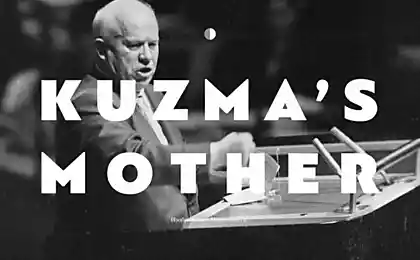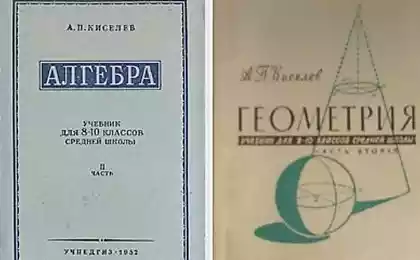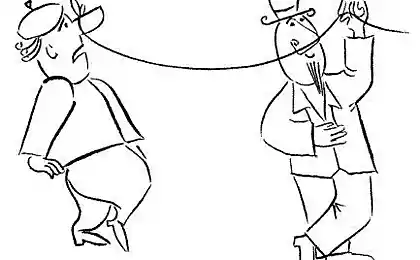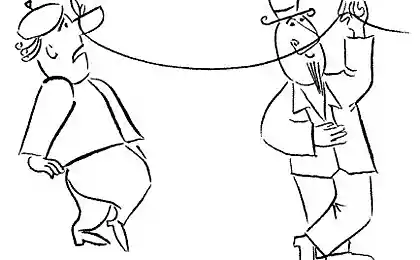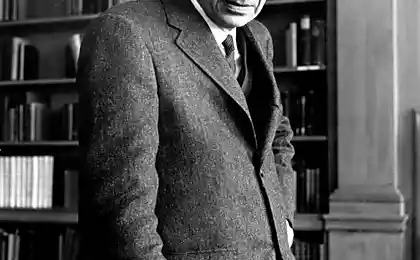651
20 expressions of true values that we use without thinking
The great and mighty Russian language! Mighty, primarily for its unique ability to "absorb" a still happening, securing stable expression in speech -. Idiom Website has collected two dozen stories common Russian idioms. Their true value is very curious!

1. Where did the expression "nodding acquaintance" and "arrive at the finish?" According to tradition, the men in Russia at the entrance to the church took off their hats and put them at the entrance, and on the service end of the dismantled them back. Anyone who was late, came already at the finish, and since then it was fixed within the meaning of the expression "go anywhere too late, when everything was over." And the expression "nodding acquaintance", meaning superficial and cursory acquaintance with someone, is also associated with the old custom. When you meet acquaintances or friends, they are greeting lifted the hat, and just friends shook hands.
2. Where did the expression "go in English"? When someone leaves without saying goodbye, we use the term "left in English." Although this idiom originally thought up by the British, and it sounded like «to take French leave» ( «leave in French"). It appeared during the Seven Years' War in the 18th century, in mockery of the French soldiers, voluntarily leaves the location of the part. At the same time the French have copied this expression, but against the British, and in this form it was fixed in the Russian language.
3. Where did the expression "goof"? Prosak used to be called a special machine for weaving ropes and ropes. He had a complex structure and so much wrung strands that hit him in the clothes, the hair, the beard could cost a person their life. It is from such cases was the expression "goof", which today means to be in an awkward position.
4. Where did the expression "go up the hill?" In the early 19th century by the people was a popular card game "Hill", something resembling poker. When a player starts the betting, forcing the partners to give in, of him saying that he "goes up the hill." Later this expression has penetrated into everyday language and is now used to refer to someone who constantly improves his position and making progress.
5. The earlier in the Catholic Church engaged in devil's advocate Until 1983, there was a special position in the Catholic Church - devil's advocate. This person's job is to collect all the possible arguments against the canonization of another righteous candidate. In contrast to The Devil's Advocate there was another post - the god of the defender, whose functions were opposed. The term "devil's advocate" modern language is often used to refer to people who defend the position, which they themselves do not adhere.
6. Where did the expression "beluga roar"? Silent fish beluga has no relation to the expression "beluga roar", which means loud and strong shout, cry. Previously beluga named not only fish, but also polar dolphin, which is now known to us as the beluga and features a loud roar.
7. Why speak about the aristocrats that they have blue blood? The Spanish royal family and the nobility were proud to trace their ancestry from the West is ready and never mingled with the Moors, infiltrated into Spain from Africa. Unlike smuglokozhih commoners, pale skin stood out representatives of the upper class blue veins, and so they called themselves the "sangre azul", which means "blue blood." It is an expression to describe the aristocracy has penetrated into many European languages, including Russian.
8. Where did the expression "bosom friend?" The old expression "pour over his Adam's apple" meant "to drink", "drinking alcohol." It was formed idiom "bosom friend", which is now used to refer to a very close friend.
9. Where did the expression "get to grips"? In Ancient Rus cakes baked in the shape of the castle with a round bow. Citizens often bought rolls and ate them on the street, holding the bow, or the handle. For reasons of hygiene in food handle itself did not use, and gave it to the poor or thrown to be devoured by dogs. According to one version, about those who are not averse to eat it, saying, reached the handle. Today, the expression "get to grips" means absolutely down, losing a human face.
10. Where did the expression "spread the idea of the tree," In the first edition of "Lay" from 1800 can be found strings: "Bojan prophetic, if someone wanted to lay down a song, spread the idea of the tree, a gray wolf on the ground, a bluish eagle under the clouds. " A strange combination of "idea of the tree," the text allowed the researchers to suggest that it was "mysiyu on the tree" in the original (translated from the ancient Russian "mys" - a protein). Either the poet wrote, "the idea is mysiyu on the tree," and lowered his scribe excess, in his opinion, the words. However, it is a popular expression was fixed as "spread the idea of the tree," which means to go into unnecessary details to distract from the main point.
11. Why crushed flies rustic veteran of "Eugene Onegin" in "Eugene Onegin", you can find the line: "He alone is settled, // // Where a village forty years old resident housekeeper quarreled, // the window and watched the flies crushed." The word "fly" is used here not in the literal sense, a metaphor for alcohol. Also known is another metaphor of a drunken man - "under the weather", where the word fly is used in the same sense
12.. Where did the expression "give a good"? In pre-revolutionary alphabet letter D called "good." Flag corresponding to this letter in the code signals Navy is set to "yes, I agree, are resolved." This was the cause of the expression "to give a good". Derived from it the expression "Nothing to Declare" first appeared in the film "White Sun of the Desert".
13. Why older Japanese say that the term "bata-bite" Haruki Murakami's oil stink? (Translated as "reeking of oil") is not drinking milk Japanese call all alien and pro-Western. Older Japanese have the same expression he called the writer Haruki Murakami for his commitment to the Western way of life.
14. Where did the phrase "bury the talent in the ground"? Originally called talent is the biggest weight and monetary-countable unit in ancient Greece, Babylon, Persia, and other areas of Asia Minor. From the Gospel parable of the man who received the money and hid them, afraid to invest in the business, there was the phrase "bury the talent in the ground." In the modern Russian language, this expression has become portable shade in connection with the new value of the talent of speech and is used when a person does not care about the development of their abilities.
15. Where did the term "permeate"? By order of the British Admiralty since 1776 in the manufacture of ropes for navy in them should be woven into the red thread that it was impossible to remove even a small piece of rope. Apparently, this measure was designed to reduce theft of cables. Hence the term "permeate" about the main idea of the author throughout the literary work, and the first it was used by Goethe's novel
16 "Related nature.". Why TV series called "soap operas"? In the 1930s, American radio programs were serialized with teargas unpretentious subjects. They were sponsored by manufacturers of soap and other cleaning products, as the primary audience for these programs were housewives. Therefore, for the radio, and later television series was fixed expression
«soap opera».
17. Where did the phrase "pour on the first number?" In the old days of school students are often flogged, often even without any guilt offense. If the teacher showed a special zeal, and the student got it especially hard, it could release from further flaw in the current month until the first of next month. It arose because the phrase "pour on the first number»
18.. Where did the term "orphan Kazan?" After the capture of Kazan Ivan the Terrible, wanting to bind the local aristocracy, which were awarded to him voluntarily senior Tatars. Many of them, to get rich gifts, pretending strongly affected by the war. Hence an expression of "orphan Kazan».
19. Where did the term "no-brainer" source expression "no-brainer" - Mayakovsky's poem ( "Clearly, even a hedgehog - / This Peter was bourgeois"). Widespread it received in the first Strugatsky novel "Land of Crimson Clouds", and then in the Soviet boarding schools for gifted children. They recruited adolescents who left to study for two years (classes A, B, C, D, E) or one year (classes E, F, I). Students one-stream and named - "hedgehogs". When they came to the orphanage, dvuhgodichniki already ahead of them in a non-standard program, so at the beginning of the school year the phrase "no brainer" was very important.
20. Where did the term "rub points" in the 19th century, cheats, gamblers have resorted to a trick: in the game using a special adhesive composition are applied to the card extra points (red or black marks) of the powder, and could erase these points if necessary. Hence the expression "rub points", meaning representation of something in a positive light.
via muzey-factov.ru/tag/idioms

1. Where did the expression "nodding acquaintance" and "arrive at the finish?" According to tradition, the men in Russia at the entrance to the church took off their hats and put them at the entrance, and on the service end of the dismantled them back. Anyone who was late, came already at the finish, and since then it was fixed within the meaning of the expression "go anywhere too late, when everything was over." And the expression "nodding acquaintance", meaning superficial and cursory acquaintance with someone, is also associated with the old custom. When you meet acquaintances or friends, they are greeting lifted the hat, and just friends shook hands.
2. Where did the expression "go in English"? When someone leaves without saying goodbye, we use the term "left in English." Although this idiom originally thought up by the British, and it sounded like «to take French leave» ( «leave in French"). It appeared during the Seven Years' War in the 18th century, in mockery of the French soldiers, voluntarily leaves the location of the part. At the same time the French have copied this expression, but against the British, and in this form it was fixed in the Russian language.
3. Where did the expression "goof"? Prosak used to be called a special machine for weaving ropes and ropes. He had a complex structure and so much wrung strands that hit him in the clothes, the hair, the beard could cost a person their life. It is from such cases was the expression "goof", which today means to be in an awkward position.
4. Where did the expression "go up the hill?" In the early 19th century by the people was a popular card game "Hill", something resembling poker. When a player starts the betting, forcing the partners to give in, of him saying that he "goes up the hill." Later this expression has penetrated into everyday language and is now used to refer to someone who constantly improves his position and making progress.
5. The earlier in the Catholic Church engaged in devil's advocate Until 1983, there was a special position in the Catholic Church - devil's advocate. This person's job is to collect all the possible arguments against the canonization of another righteous candidate. In contrast to The Devil's Advocate there was another post - the god of the defender, whose functions were opposed. The term "devil's advocate" modern language is often used to refer to people who defend the position, which they themselves do not adhere.
6. Where did the expression "beluga roar"? Silent fish beluga has no relation to the expression "beluga roar", which means loud and strong shout, cry. Previously beluga named not only fish, but also polar dolphin, which is now known to us as the beluga and features a loud roar.
7. Why speak about the aristocrats that they have blue blood? The Spanish royal family and the nobility were proud to trace their ancestry from the West is ready and never mingled with the Moors, infiltrated into Spain from Africa. Unlike smuglokozhih commoners, pale skin stood out representatives of the upper class blue veins, and so they called themselves the "sangre azul", which means "blue blood." It is an expression to describe the aristocracy has penetrated into many European languages, including Russian.
8. Where did the expression "bosom friend?" The old expression "pour over his Adam's apple" meant "to drink", "drinking alcohol." It was formed idiom "bosom friend", which is now used to refer to a very close friend.
9. Where did the expression "get to grips"? In Ancient Rus cakes baked in the shape of the castle with a round bow. Citizens often bought rolls and ate them on the street, holding the bow, or the handle. For reasons of hygiene in food handle itself did not use, and gave it to the poor or thrown to be devoured by dogs. According to one version, about those who are not averse to eat it, saying, reached the handle. Today, the expression "get to grips" means absolutely down, losing a human face.
10. Where did the expression "spread the idea of the tree," In the first edition of "Lay" from 1800 can be found strings: "Bojan prophetic, if someone wanted to lay down a song, spread the idea of the tree, a gray wolf on the ground, a bluish eagle under the clouds. " A strange combination of "idea of the tree," the text allowed the researchers to suggest that it was "mysiyu on the tree" in the original (translated from the ancient Russian "mys" - a protein). Either the poet wrote, "the idea is mysiyu on the tree," and lowered his scribe excess, in his opinion, the words. However, it is a popular expression was fixed as "spread the idea of the tree," which means to go into unnecessary details to distract from the main point.
11. Why crushed flies rustic veteran of "Eugene Onegin" in "Eugene Onegin", you can find the line: "He alone is settled, // // Where a village forty years old resident housekeeper quarreled, // the window and watched the flies crushed." The word "fly" is used here not in the literal sense, a metaphor for alcohol. Also known is another metaphor of a drunken man - "under the weather", where the word fly is used in the same sense
12.. Where did the expression "give a good"? In pre-revolutionary alphabet letter D called "good." Flag corresponding to this letter in the code signals Navy is set to "yes, I agree, are resolved." This was the cause of the expression "to give a good". Derived from it the expression "Nothing to Declare" first appeared in the film "White Sun of the Desert".
13. Why older Japanese say that the term "bata-bite" Haruki Murakami's oil stink? (Translated as "reeking of oil") is not drinking milk Japanese call all alien and pro-Western. Older Japanese have the same expression he called the writer Haruki Murakami for his commitment to the Western way of life.
14. Where did the phrase "bury the talent in the ground"? Originally called talent is the biggest weight and monetary-countable unit in ancient Greece, Babylon, Persia, and other areas of Asia Minor. From the Gospel parable of the man who received the money and hid them, afraid to invest in the business, there was the phrase "bury the talent in the ground." In the modern Russian language, this expression has become portable shade in connection with the new value of the talent of speech and is used when a person does not care about the development of their abilities.
15. Where did the term "permeate"? By order of the British Admiralty since 1776 in the manufacture of ropes for navy in them should be woven into the red thread that it was impossible to remove even a small piece of rope. Apparently, this measure was designed to reduce theft of cables. Hence the term "permeate" about the main idea of the author throughout the literary work, and the first it was used by Goethe's novel
16 "Related nature.". Why TV series called "soap operas"? In the 1930s, American radio programs were serialized with teargas unpretentious subjects. They were sponsored by manufacturers of soap and other cleaning products, as the primary audience for these programs were housewives. Therefore, for the radio, and later television series was fixed expression
«soap opera».
17. Where did the phrase "pour on the first number?" In the old days of school students are often flogged, often even without any guilt offense. If the teacher showed a special zeal, and the student got it especially hard, it could release from further flaw in the current month until the first of next month. It arose because the phrase "pour on the first number»
18.. Where did the term "orphan Kazan?" After the capture of Kazan Ivan the Terrible, wanting to bind the local aristocracy, which were awarded to him voluntarily senior Tatars. Many of them, to get rich gifts, pretending strongly affected by the war. Hence an expression of "orphan Kazan».
19. Where did the term "no-brainer" source expression "no-brainer" - Mayakovsky's poem ( "Clearly, even a hedgehog - / This Peter was bourgeois"). Widespread it received in the first Strugatsky novel "Land of Crimson Clouds", and then in the Soviet boarding schools for gifted children. They recruited adolescents who left to study for two years (classes A, B, C, D, E) or one year (classes E, F, I). Students one-stream and named - "hedgehogs". When they came to the orphanage, dvuhgodichniki already ahead of them in a non-standard program, so at the beginning of the school year the phrase "no brainer" was very important.
20. Where did the term "rub points" in the 19th century, cheats, gamblers have resorted to a trick: in the game using a special adhesive composition are applied to the card extra points (red or black marks) of the powder, and could erase these points if necessary. Hence the expression "rub points", meaning representation of something in a positive light.
via muzey-factov.ru/tag/idioms
The system of rescue of all passengers and crew in the event of a plane crash!
This house is on a cliff marks 111 years

